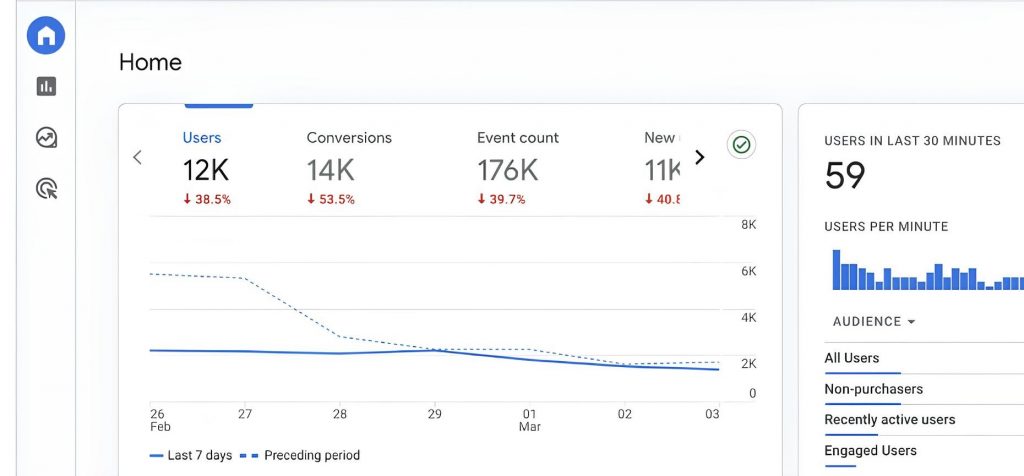Data Science for SEO: Leveraging Analytics for Better Search Performance
Enhance SEO with data science by using advanced analytics to optimize search performance, identify trends, and drive more effective, data-driven strategies.
Understanding the Fundamentals of Data Science
Before we jump into the nitty-gritty, let’s get our heads around what data science actually means in the context of SEO. It’s not just about crunching numbers – it’s about extracting valuable insights from the vast sea of data that’s out there. Data scientists and SEO professionals are now working hand in hand to drive more traffic and improve a website’s visibility in search engine results pages. So, how to use data science for seo? Let’s see together!
The Data Analytics Lifecycle in SEO
Think of the data analytics lifecycle as a circular journey. It starts with collecting data from various sources like Google Analytics, Google Search Console, and even Google Data Studio. Then, we clean it up (because let’s face it, raw data can be messy and often contains missing values), analyze data, and use those actionable insights to make informed decisions. This ongoing process is crucial for staying on top of the ever-changing search engine optimization game and improving your website’s performance.
Traditional SEO vs. Data Science SEO: Key Differences
In the classical sense, SEO is about keywords, meta tags, site structure, and reference mass. This is done by marketers, content creators, and SEO specialists. Their goal is to make the site appear higher in search results. Everything seems to be simple: the correct headers, frequent requests, a little technical optimization, and you can count on traffic.
But this approach has a limit. Especially if you work in a competitive niche where everyone is fighting for the front page. This is where what we call data science SEO begins.
What’s the difference?
|
Criterion |
Traditional SEO | SEO using data science |
|
Data sources |
Google Analytics, Search Console |
+ CRM, user behavior, session data, logs |
|
Technique |
Manual analysis, rules, templates |
Models, clustering, NLP, ML |
|
Content strategy |
Based on intuition and best practices |
Based on the analysis of real demand and user segments |
|
Efficacy evaluation |
By position and traffic |
By impact on business metrics (leads, sales, ROI) |
|
Competitor analysis |
Superficial |
Semantics, structure, and content strategy |
|
Forecasting results |
Depends on the experience of a specialist |
Supported by forecasting models |
| Personalisation | Minimal or none |
Possible at the level of search clusters and segments |
Benefits of Data-Driven Decision Making in SEO
Moving from subjective hypotheses to real data is not just a change of approach. This is a reassessment of SEO’s very role in the business.
That’s why more companies are rethinking their attitudes towards SEO and adopting a data-driven approach:
- SEO begins to bring not traffic, but money
Traffic for the sake of traffic is a dead investment. The data-driven approach allows you to associate SEO with business metrics: lead attraction cost, conversion, and LTV. In other words, you see not just an increase in positions, but the impact of SEO on P&L.
- Optimize time and resources
Classic SEO involves ongoing tests, many of which do not work. The data-driven approach allows you to run only what has a high probability of working. This reduces costs and speeds up the output.
- Real-time demand analysis
Machine learning and NLP allow you to analyze user behavior not at the end of the month, but daily, in real-time. This makes it possible to quickly respond to changes in interests and the emergence of new requests, even before competitors pick them up.
- Deep analysis of competitors
You can not just find out which pages work for them, but why. What types of content get backlinks, what topics create engagement, where competitors have “holes”, and how they can be used.
- Personalizing content
The data allows you to segment the audience not by general avatars, but by specific interests, devices, and trajectories of behavior. This opens up the opportunity to create an SEO strategy not “for everyone”, but for specific groups of users, which increases engagement and conversion.
And what in the end?
SEO ceases to be a box with randomly folded instruments and turns into a controlled process, where each action has a digital justification. This is especially critical for companies where resources are limited and demand for efficiency is high.
When you see how data works on revenue growth, the attitude towards SEO itself changes. It ceases to be “marketing” and becomes part of the company’s strategy.
If you are a top manager who is important to grow without unnecessary costs, or a business owner who is tired of funnels without results, it’s time to reconsider the approach. Data-driven SEO is not a trend, but an answer to market challenges.
Data Science’s Impact on Search Engine Optimization
Data science has turned SEO on its head – in a good way! It’s like having a superpower that lets you see patterns and opportunities invisible to the naked eye. With machine learning algorithms and advanced analytics, we can now understand user intent better than ever before, leading to more effective SEO strategies. This approach helps in improving keyword rankings and overall organic traffic.
The development of data science in SEO has been particularly transformative for every SEO outsourcing company. These firms are now able to offer their clients a level of insight and strategy that was previously unattainable. By leveraging big data and advanced analytics, SEO outsourcing companies can provide more accurate predictions, more targeted optimizations, and ultimately, better results.
Practical Applications of Data Science to Enhance SEO Efforts
The integration of data science seo has opened up a world of possibilities for enhancing search performance. Let’s dive deeper into how these applications can revolutionize your SEO efforts.
 How to use Data Science to improve SEO
How to use Data Science to improve SEO
Analyzing User Behavior Metrics for Improved Engagement
How many people have logged into your site is not what defines success. It’s important what they did there. If you spend money on traffic, content, and SEO, but do not analyze user behavior, you work blindly.
The question is not the number of visits, but rather an interaction. The better you understand how users behave on the site, the more accurately you can customize the content, interface, and path to conversion.
What is important to analyze
Data is not just tables. These are signals. Below are key behavioral metrics that can (and should) be tracked to make decisions about data analytics services:
|
Metrics |
What it shows | Why is important |
|
Average Session Duration |
How much time does a
person spend on the site |
If long, there has been of interest in content |
|
Bounce Rate |
Whether the user left
immediately after logging in |
High indicator – a signal that something is wrong |
|
Pages per Session |
How many pages are viewed
per visit |
Higher engagement |
|
Scroll Depth |
How far a person
scrolls the page |
Helps to understand if articles are read to the end |
|
Click-through Rate (CTR) |
How many people click on specific items |
Important for assessing the effectiveness of headers and CTAs |
| Exit Rate | From which pages users most often leave |
Helps you find bottlenecks in your site structure |
How is it applied in practice
Let’s say you have a blog article. Everything seems to be correct: the keywords are placed, the headers work, and the picture is there. But the bounce rate is 85%, and the scroll depth is less than 25%. This means that people leave without even reading half. There can be many reasons: slow loading, irrelevant title, too complex text, and poor structure. And all this can be checked if you look not at the positions on Google, but at the behavior of the reader.
Behavior analysis also shows which pages actually work for the business. For example, you see that the page with the description of the case gives less traffic, but higher conversion to the application. This is a signal: perhaps it is worth focusing not on info content, but on examples of solutions.
What to do with these metrics
The numbers themselves do nothing. Actions must follow them. For example:
- High bounce rate? Check whether the header matches the content.
- Low scroll depth? Simplify the feed, add structure, and remove the unnecessary.
- Few CTA jumps? Change the wording or position of the button.
Long time on the page, but no conversion? Perhaps the user does not understand what to do next.
Data interpretation must be built into your SEO and content work process. Only then will user behavior turn into a strategic advantage.
Optimizing Website User Experience Through Data Analysis
A great user experience isn’t just about pretty design. It’s about using data analysis to understand what users want and giving it to them in the most efficient way possible. This might involve using tools like heat maps to see how users interact with your website content.
Conducting In-Depth SEO Competitor Analysis
Know the enemy, right? Data science seo tools let you peek under the hood of your competitors’ strategies, giving you insights to outmaneuver them in the search results. This might involve analyzing their backlink strategies or content strategy to identify areas for improvement in your own approach.
Implementing AI-Powered Link-Building Strategies
Link building gets a high-tech makeover with AI development services. It’s like having a smart assistant that knows exactly which links will give your site the biggest boost in search engine rankings.
Utilizing Predictive Analytics for Trend Forecasting
Stay ahead of the curve by predicting upcoming trends. Use historical data and machine learning development services to forecast what topics will be hot in your niche, allowing you to create content that ranks well before your competitors even realize the opportunity.
Monitoring Search Engine Rankings and Performance
Keep a finger on the pulse of your search performance with real-time monitoring. Use data science seo techniques to track your key performance indicators and make data-driven decisions to improve your SEO performance.
Adapting to Algorithm Updates with Data-Driven Approaches
When search engines throw a curveball with an algorithm update, seo data science helps you adapt quickly. It’s like having a Swiss Army knife for SEO – you’re prepared for anything, whether it’s changes in how search engines interpret user intent or shifts in the importance of certain ranking factors.
Does your SEO strategy nees Data Science approach?
Implementing a Data Science Approach in Your SEO Strategy
In today’s digital landscape, integrating data science into your SEO strategy is no longer optional—it’s essential. By harnessing the power of data analytics, machine learning, and predictive modeling, businesses can gain a competitive edge and dramatically improve their search engine performance.
A data-driven SEO approach begins with comprehensive data collection. This involves gathering information from various sources, including website analytics, search console data, competitor analysis, and industry trends. The key is to cast a wide net, ensuring you have a robust dataset to work with.
Defining Clear SEO Objectives
Before delving into data analysis, it’s crucial to establish clear, measurable objectives. Think of these as your strategic compass. Are you aiming to increase organic traffic by a specific percentage within a set timeframe? Perhaps your goal is to achieve top rankings for certain keywords, or to improve conversion rates from organic search. Whatever your objectives, articulate them clearly and ensure they align with your overall business goals. These objectives will guide your data collection efforts and help you focus on the metrics that truly matter.
Collecting and Analyzing Relevant Data
 How to collect data from google analytics
How to collect data from google analytics
With objectives in place, the next step is to gather pertinent data. While tools like Google Analytics and Search Console are invaluable, don’t limit yourself to these sources. Consider incorporating data science seo from social media platforms, customer relationship management (CRM) systems, and industry-specific sources to gain a comprehensive view of your SEO landscape. The key is to collect data that directly relates to your defined objectives. Remember, the goal isn’t just to amass numbers, but to uncover the stories and patterns within the data that can inform your strategy.
Uncovering SEO Opportunities Through Data
This stage is where data science truly shines in SEO. Utilize data visualization techniques to identify patterns and trends that might not be apparent in raw data. You might discover untapped keyword opportunities, content gaps, or user behavior patterns that could significantly impact your strategy. Be open to unexpected insights – sometimes the most valuable opportunities are hidden in seemingly unrelated data points. Advanced techniques like clustering analysis or predictive modeling can reveal deeper insights and future trends, giving you a competitive edge.
Formulating and Executing Data-Driven SEO Strategies
Armed with data-driven insights, it’s time to develop and implement your strategies. This might involve refining your content strategy based on user engagement data, adjusting your site structure to improve user flow, or reallocating resources to high-potential keywords identified through your analysis. Remember that your strategies should directly address the objectives you set initially. Be prepared to challenge existing assumptions and practices if the data suggests more effective approaches. The key is to let the data guide your decisions while still applying your expertise and industry knowledge.
Evaluating SEO Campaign Results
Implementing your strategies is not the end of the process, but rather the beginning of a new cycle. Continuously monitor and evaluate the results of your efforts against your initial objectives. Utilize A/B testing to validate hypotheses and refine your approach. Regular SEO audits and ongoing analysis of key performance indicators will help you understand the effectiveness of your strategies and identify areas for improvement. Be prepared to iterate and adjust your approach based on these results. Remember, in the dynamic world of SEO, agility and adaptability are key to long-term success.
Elevating SEO Performance with Data-Driven Insights
By embracing seo data science, you’re not just improving your SEO – you’re revolutionizing it. It’s about working smarter, not harder, and letting the data guide your way to search engine success. This approach can significantly boost your website traffic and improve your digital presence.
Benefits of using Data Science for SEO
Challenges in Data Science for SEO
When SEO intersects with data science, the possibilities become wider, but the difficulties are added. This is not just about keyword matching or technical optimization. This is already working with models, hypotheses, and signals from large amounts of user data. And here their pitfalls appear.
1. Data ≠ knowledge
Even if a company has access to data, this does not mean that it will be beneficial. Frequently:
- Data is scattered or stored in different systems.
- There is no unified approach to collecting metrics.
- SEO specialists do not know how to interpret complex models.
In conclusion, there are numbers, but no conclusions. Or there are reports, but no actions.
2. Lack of expertise
Classic SEO relies on templates and tools that experts are used to. Seo data science requires another logic: understanding probabilistic models, A/B testing, clustering methods, and knowledge of Python. This greatly raises the entry threshold.
The solution: involve analysts or reach out to external teams that are already working at the intersection of SEO and data science.
3. Long implementation cycle
When you set up an ML model to predict search traffic or assess content quality, results do not appear immediately. It is necessary:
- collect historical data;
- perform preparation and cleaning;
- build and train a model;
- test hypotheses;
- implement – and only then measure the effect.
It’s a long way, especially if you wait for an instant return.
4. Difficulties in model interpretation
A number of models, especially those based on neural networks, do not give “transparent” answers. They work like a “black box”: there is a result, but why it is so is not clear.
In SEO, this is critical: if you cannot explain to the client or management why a certain page has risen or fallen, no decision is made.
Solution: use interpreted models (for example, decision trees or logistic regression for MVP), and only then complicate.
5. Resistance within the team
Teams that are accustomed to working with templates (Title → Description → Keywords) may resist the introduction of data science. Especially if it requires a revision of processes, additional time, and training.
It is important to understand: the introduction of an analytical approach in seo data science is a change in culture. It does not always go easily.
Embracing the Future of SEO with Data Science
As we look to the future, it’s clear that data science will play an increasingly crucial role in SEO. The digital landscape is evolving at a rapid pace, and those who embrace these advanced techniques now will be well-positioned to thrive in the coming years.
The integration of machine learning and artificial intelligence into search algorithms means that traditional SEO practices alone are no longer sufficient. Search engines are becoming more sophisticated in understanding user intent, context, and the relationships between different pieces of content. This complexity demands a more nuanced, data-driven approach to SEO.
Data science enables SEO professionals to:
- Predict trends: By analyzing historical data and current patterns, we can anticipate shifts in user behavior and search engine algorithms, allowing for proactive strategy adjustments.
- Personalize content: With advanced segmentation and user behavior analysis, we can create highly targeted content that resonates with specific audience segments.
- Optimize for voice search: As voice-activated devices become more prevalent, seo data science can help us understand and optimize for natural language patterns used in voice queries.
- Leverage real-time data: With the right tools and processes in place, we can make instant adjustments based on real-time performance data, ensuring our strategies are always optimized.
- Automate routine tasks: Machine learning algorithms can take over time-consuming tasks like keyword research and content optimization, freeing up SEO professionals to focus on higher-level strategy.
The future of SEO lies in the ability to extract meaningful insights from vast amounts of data and to act on these insights quickly and effectively. It’s about understanding not just what is happening, but why it’s happening and what’s likely to happen next.
However, it’s important to note that while data science provides powerful tools, it doesn’t replace human creativity and intuition. The most successful SEO strategies will combine data-driven insights with human expertise and understanding of brand values and audience needs.
It’s an exciting time to be in SEO. The field is becoming more complex, more challenging, and more rewarding than ever before. For those willing to invest in developing their data science skills and embracing a more analytical approach, the opportunities are boundless.
So let’s dive in and start exploring the possibilities that data science offers! Whether you’re just starting out in SEO or you’re a seasoned professional looking to up your game, now is the time to embrace the data-driven future of our field. The tools and knowledge are at our fingertips – it’s up to us to use them to push the boundaries of what’s possible in SEO.
Final thoughts
SEO, apart from analytics, no longer works. Competition has intensified, content has become similar, and user attention is getting shorter. It’s not enough for a business to just “be at the top”. It is important to understand how the site works, why the user behaves this way and not otherwise, and how this affects money.
Data science in SEO gives exactly this understanding. But only with the right approach: when the data is clean, the goals are clear, the models are explainable, and solutions are implemented.
What to do business:
- If you are not using data, start at least with basic web analytics.
- If you use, but do not get value, check how decisions are made: by reports or by intuition?
- If everything works, but there is no growth, you may lack the depth of analysis and the right models.
The question is not the data. The question is what you do with them.
FAQ
Which data science tools are best for SEO analysis?
For SEO analytics, they most often use Python (Pandas, Scikit-learn, BeautifulSoup, TensorFlow libraries), R, Google BigQuery, Tableau, Looker, as well as automation tools like Apache Airflow. They help collect, process, visualize, and interpret real-time data.
What role does data science play in modern SEO strategies?
Data science enables you to transition from intuitive SEO to data-driven solutions. This includes analyzing user behavior, predicting traffic, automatically clustering keywords, optimizing content, and identifying technical issues that affect search positions.
What are the most important metrics to track using data science?
Key metrics include CTR, bounce rate, average session duration, conversion rate, scroll depth, keyword rankings, page load time, and behavioral patterns (such as the user’s path through the site). With the help of data science, you can not only fix these values but also find relationships between them and user actions.







